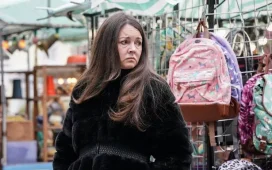Douglas certainly could have. Three years earlier, he was well aware that his much younger co-host Madeline, played by Karen Gillan, was in danger from a predatory male colleague, and didn’t help her. Not only that, but in the years since, he repeatedly used the fact that Madeline was (he thinks) coerced into sex by their boss, as a cruel punchline with which to humiliate her behind her back.
Now, facing public ‘cancellation’ for having been overheard telling this zinger, Douglas feels abashed. He lies about not being able to remember the joke, and only confronts his personal shame when forced to by Madeline’s militarily exacted revenge plan.
That’s right. Years after the event, Madeline goes to extreme lengths to bring this man who passed by on the other side of the road, to a humbling realisation about what he, and we, have been reasonably led to believe was her rape. (Between that, and young Madeline having idolised bland Douglas instead of say, one of the Newsnight women “with an opinion” of whom he’s so afraid, plus the fact that we never see her interact with a single female friend or relative, it’s safe to assume that realism wasn’t the goal with this one.)
Exploring bystander complicity is a fair idea. We could all stand to examine our part in brushing harm under the carpet, and we could all try to do better. Douglas Is Cancelled in particular should have done better, because its final episode contains a scene that’s not just a crass take on sexual harassment, it’s an insult.
Episode three is when Douglas Is Cancelled changes tack, switching from cynical industry satire to tense, human drama. In a flashback, Madeline goes to a hotel room for an informal chat about a new job with producer Toby (Ben Miles), who, after a landmine-filled conversation about politics, makes it clear that he wants sex in exchange for employing her.
Actors Gillan and Miles play it extremely well, and everything unfurls with sickening inevitability. This is the first time that the show has approached dramatic urgency, and it’s a major shift in tone from director Ben Palmer. The episode is well-written and involving, and Gillan is excellent at conveying Madeline’s disguised panic and conversational weight-shifts to try to reach solid ground.














